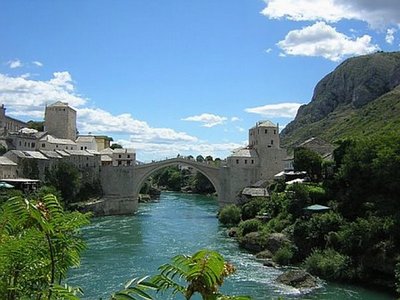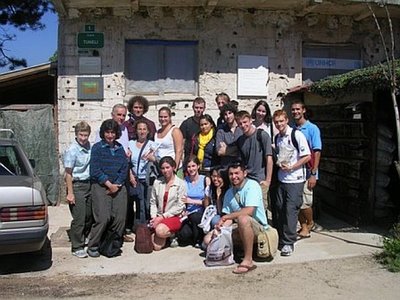November 2, 2006
Advisers learn whereof they speak, tagging along for Exploration Seminars
For years, UW advisers have been urging students to study abroad, without, in most cases, knowing what awaited them in the countries where they landed. But this year, 19 advisers went along for a portion of what the University calls Exploration Seminars — four-week programs abroad that take place between summer and fall quarters.
The result? Nineteen true believers.
“I work with students applying for scholarships, and now with every student I see, I ask if they know about Exploration Seminars,” said Vega Subramaniam, who works in the Undergraduate Scholarship Office.
Her response is typical. When the group of traveling advisers gathered after their return, the atmosphere in the room crackled with excitement.
Which doesn’t mean that the study programs were the equivalent of lying on the beach in Hawaii. Take Subramaniam’s seminar, Explorations in Social Justice, for example. It took place in Bangalore, India, where participants stepped outside their hostel in the morning and were immediately accosted by the savvy rickshaw drivers, who — seeing that they were foreigners — demanded up to three times what a local would pay for the trip to their class meeting site.
“The haggling was nerve wracking,” Subramaniam said. “There were times when I was ready to walk the two or three miles in the heat and humidity rather than face it. It wasn’t a pleasant interaction.”
Subramaniam, whose family is from India, had been to the country many times, but this was different. Her relatives had taken care of the haggling in the past, she explained. She had been sheltered. This time, along with the students, she got a lesson in social justice that wasn’t on the syllabus.
“The typical rickshaw driver makes 100 rupees a day, or about $2,” said Anu Taranath, the faculty director of the seminar. “I tell students that they need to put experiences like this in a larger context and realize it’s not about them. The students are privileged to be able to travel and they say, ‘It’s so cheap here.’ But the other side of that is the rickshaw driver who wants to charge more. They can’t say ‘I should be treated like every other customer’ because they’re not like every other customer.”
For Subramaniam, the trip was “transformational in a way I wouldn’t have expected. Since I had been to India before, I thought it would be a ‘been there, done that’ sort of thing. But I realized that when I visited family, that was one small snapshot of what India is. I learned so much because we got so much information. I left with a different appreciation and understanding of what Bangalore is.”
Mary Nysether, who works in international admissions, was also returning to old haunts in Bosnia, Croatia and Serbia, but the area was called Yugoslavia when she last visited back in 1968, and a war had changed everything. So her seminar, called Peacebreaking and Peacemaking in the Balkans, was the academic background for the before and after of her experience.
“Before we left we had a 120-page packet of reading,” Nysether said. “Then after we got there, we had another big packet. It gave us a historical perspective on the war. In the mornings we’d go to class and discuss the articles or hear speakers; in the afternoon we’d go on field trips.”
Tamara Leonard, one of two program directors for the seminar, appreciated Nysether’s previous experience with the country, but also had a more general appreciation for the advisers who went along, saying it meant that faculty directors had another “senior” person who is not a student along.
“One important feature of the Exploration Seminar program is that it gives a small college experience,” she said. “That happens because the professors work with 20 students or fewer, so they can develop personal relationships that lead to mentorships and other ties that might not otherwise happen. And advisers give students another person they can get to know, someone who is not evaluating their work. I think every program should have at least one of them go along.”
That is not likely to happen, given financial constraints. According to Paul LePore, assistant dean in the College of Arts and Sciences, a special infusion of money from the Provost’s Office made the support of this year’s large group of advisers possible. But he expects that four or five will be sent each year from now on.
Why advisers? Because, in LePore’s words, they serve as “the interface between students and departments.” When he and other planners were trying to figure out how best to market the seminar offerings, they thought that bringing advisers along would translate to more students hearing about them and considering participation. Some advisers — such as Mary Harty in chemistry — have gone further, helping to establish a seminar sponsored by their own department.
Because this was the first year that advisers participated in the seminars, most did not have an official role. However, Judith Clark, who participated in the School of Art’s seminar in Rome, used her art history degree to do some teaching. Other participants, such as Julie Villegas, an Honors Program associate director who went to Kenya, said that her advising role traveled with her.
“I found there was a real eagerness among the students to have someone ‘outside’ to talk to, to share their experiences and get some advice,” she said. “And I did a little recruiting for the Honors Program along the way.”
LePore said he hoped that, now that the first year is over, roles for advisers would be more explicit. “We’ll be giving some suggestions to faculty directors,” he said.
“We” includes the College of Arts and Sciences, the Office of Global Affairs, the International Programs and Exchanges Office and the Comparative History of Ideas Program, which have up to now been running the Exploration Seminars using time borrowed from their staffs. But recently, Max Savishinsky, assistant director of Latin American Studies Center in the Jackson School, has been hired to direct the program, thus giving it more stability. Explorations Seminars, LePore said, are definitely here to stay.
The advisers are on board with that.
Clark, who advises in art, said going along on a program the school sponsored gave her firsthand information. “And firsthand information makes you a better adviser.
Villegas, who has traveled extensively and helped to run study abroad programs elsewhere, signed up for this one because she said she was afraid to go to Africa. “I don’t know why; it was just a big unknown to me. But after I relaxed and opened up to a new culture, I had an amazing experience.”
Now, she said, she has “lived experience” to offer the students. “I can tell them that sometimes if you’re afraid of something, that’s the reason you should go forward. Culture shock is part of the experience.”


